Robert Butler, Antipodean Jailbird
Where Robert Butler was born, and when, and under what name, is somewhat of a confused question. He was an immigrant to Australia who arrived as a small child (around three or four years old) sometime between 1847 and 1855. His family were probably from Kilkenny in Ireland, but they could have been from Bury in Lancashire, England. His original name might have been James Wharton, or it might actually have been Robert Butler, or it might have been any of the other half-dozen names he gave as an alias throughout his career. The Australian and New Zealand newspapers decided to go with Robert Butler, and that’s what’s stuck since.
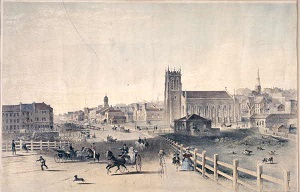
Robert first enters the records in the early 1860s, when he was arrested in Melbourne for vagrancy. (What happened to the family that came over from England with him is unknown.) He gave his age as thirteen (and his name as “James Wilson”), but he may have been lying in order to get a lower sentence. For the crime of homelessness and unemployment (aka “vagrancy”) he was sentenced to a year in prison. On his release he was given a few months to attempt to find work, but when he didn’t he was sentenced to six months in prison. After that sentence he, in the words of a later newspaper, “graduated into the ranks of crime proper”.
Robert’s first crime was stealing a watch – a popular target for thieves at the time as they they were both expensive and easily portable. Robert was caught, convicted, and sentenced to a year’s hard labour. As soon as he finished that sentence he was arrested and got five years for mugging a man in on of the city parks, by springing out on him with a gun drawn. In 1871 Robert was arrested again, this time for burglary. (This time he gave his name as “George Lee”.) He got five years again, and was released in 1876. All told he had just spent 11 of the last 12 years involuntarily working on the Australian roads. Small wonder that he decided to get out of Melbourne, and in fact to leave Australia altogether.
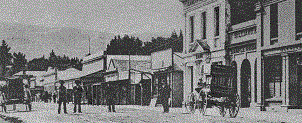
Robert moved from Australia to New Zealand, though this was illegal for him to do at the time. The law forbade anyone who went to prison from “changing colony” for three years, though the enforcement of this was by its nature haphazard. Still, this was probably why he was calling himself “CJ Donnelly” when he took a position as a teacher at a Catholic school in the town of Cromwell. He seems to have been able to carry the job off without any complaints, which is surprising given his apparent lack of formal education. Either he had been well schooled before he ended up on the streets, or he had spent his time behind bars and on the roads educating himself. In addition to his work at the school, he set up a night school in the town for the adults, which proved very popular. Sadly though, this attempt at a normal life couldn’t last. Somebody stole £75 (a large amount at the time) from the room of the school’s priest. Whether or not it was Robert who did it, he clearly knew that any investigation would reveal his true identity and background. So he abandoned Cromwell, and any hope of ever living a “normal life”.
Robert went to Dunedin, where he threw himself back into a life of crime with predictable consequences. His first target was the Queen’s Theatre, which he broke into on the 23rd July. He stole two wigs, two pistols and a cornet from the brass section. Perhaps due to a grudge against the Catholic institutions, on the 1st August 1880 he burgled the home of Bishop Patrick Moran. The Bishop was a major exponent of having schools for Catholic children run by the church rather than as secular institutions, so Robert might even have run into him in Cromwell. Robert stole his walking stick, opera glasses and a gold pencil case. The glasses were actually the most expensive of the lot, as gold was cheap at the time while quality optics were expensive.
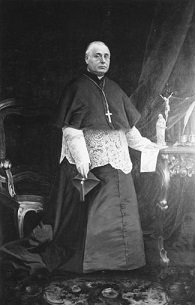
Five days later he burgled the house of Gibson Turton, a lawyer and politician. Gibson was out of town but his wife Anna was home, and Robert snuck in and stole her watch. On the 8th August he broke into another house and stole £70 of jewels, but the same night he was arrested. The police had traced him from the pawnbroker he had sold the bishop’s possessions to. Luckily for Robert, his web of false names held up. (Even the papers of the time were confused, with one report referring to him as both James and Robert in different paragraphs.) As such, his past crimes were not held against him and a statement he put in for his defence saying he was “not hardened to crime” was taken into account. He received a fairly light sentence, of only four years.
Robert was a model prisoner (he had enough practice by now), and his education made him a favourite of the prison governor. He was released on the 18th February 1880, and at the governor’s recommendation his probation officer (a Detective Bain) found him a job as a journalist at the Evening Star, with the idea that he would do some general journalism and also write them some sketches of prison life. Unfortunately though he had the talent for writing, he lacked the discipline. He missed his deadline and when Bain went looking for him he found him at the end of a pier. He had just torn up and thrown his notes into the water, and was contemplating following them. Bain suggested that he try manual labour, but this also proved to be distasteful to him. Around this time he met and had a conversation with another police officer, Inspector Mallard. The two discussed the story of Charlie Peace, who had been executed the year before. Mallard would later have good cause to recall the conversation.
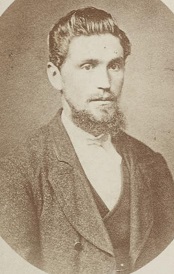
On the night of the 12th March, a fire broke out at the house of a solicitor named Stamper. The house burned to the ground, and it took some time before investigators realised that Stamper had been burgled before the fire was set. The following night another fire broke out on Cumberland Street. At half six in the morning a man who lived on the street saw smoke coming out of a neighbour’s window. He woke up his son, who was a member of the local volunteer fire brigade, and the son went to investigate. He found the house full of smoke and a fire in the bedroom, but he also found something far worse. The owner of the house (a man named James Grant) had been killed in his sleep with an axe, while his wife Elizabeth was mortally wounded on the floor. Worst of all, a small baby who had been in bed with the couple was also dead, due to smoke inhalation.
The young man, whose name was James Robb, didn’t let his shock stop him from doing what he had been trained to do. After dragging Elizabeth Grant out of immediate danger he set to work extinguishing the fire. While doing so he managed to rouse the rest of the neighbourhood, and he also found a bloody axe – presumably the murder weapon. A doctor arrived, who tried to resuscitate the baby (without success) and who had Elizabeth taken away to the hospital. She had a severe head injury, and she never regained consciousness.
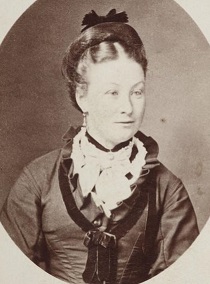
The Grants were well liked and as far as their neighbours knew had no enemies, so at first the police had no leads. There are several different versions of how suspicion first fell on Butler. One is that through his arrangement with Bain he was supposed to be out of town working. Another detective on the force knew that Robert had been infatuated with a particular girl (the daughter of a prison warden) and on meeting her asked her if he was leaving her alone. She mentioned seeing him in town the previous day, and the policeman guessed this sneaky return might be related to the tragedy. Another version was that a servant at a hotel in town approached Bain and told him that on the nights of the Stamper and Dewar incidents Robert had been absent from the hotel, then returned in the early morning and slept all day. However it happened, the police realised that Stamper affair, at least, matched Robert’s MO and so they went looking for him.
It didn’t take them long to find him. A description of Robert Butler was sent out, and two policemen recognised him from it about fifteen miles outside of Dunedin, on the road to Waikouaiti. He had shaved off his moustache and was using the name of Medway, but they were not fooled by this. Robert had a gun and made an attempt to threaten the policemen with it, but they overpowered and arrested him. He was searched, and the policemen found Stamper’s opera glasses in his bag. Robert did immediately confess to having burgled the solicitor, and was taken back to Dunedin. However once back there he was told he would be charged with the Cumberland Street killings, which he immediately denied. The press immediately began digging into his background, though none seem to have gone back as far as “James Wilson”.
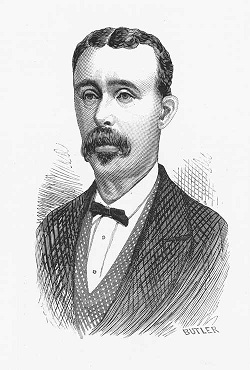
The trial began at the end of March, and Robert Butler chose to defend himself. His defence was a classic piece of legal ju-jitsu – he pleaded guilty to the charge of robbing Stamper (which was provable, and which would result in jail time) while maintaining his innocence of the Cumberland Street murders (which would have sent him to the gallows). The police had noticed that the clothes he was wearing when arrested were not the clothes he had worn on leaving his hotel, and a search of the trail soon turned up the original clothes – with suspicious bloodstains. Robert explained this away as the result of scratches he had got going through some bushes, and he did indeed have such scratches on his hands.
The motive that the Crown attributed to Robert was theft – stealing Robert Grant’s wages from the house. Robert’s defence against this was that there were a thousand better targets for burglary in the city, so why would he have chosen the house of a jobbing butcher? His contention was that, despite what the neighbours said, the murderer must have been some particular enemy of the Grants who had come there specifically to kill them. He pointed out that often murder was committed for what seemed like a meaningless grudge to outsiders, and that it was impossible to know what either of them could have done to offend someone. It wasn’t the strongest of defences, but it threw enough doubt to get him off the charge and save his neck. Instead he received 18 years for burglary and arson against Stamper.
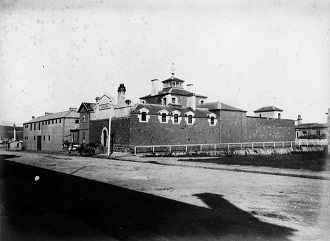
Did Robert Butler get away with murder? Two years later, an anonymous article purportedly written by a cellmate of his appeared in a New Zealand magazine. It claimed that Robert had arrived in Dunedin with a stash of jewellery, which he had brought with him from Australia. When he knew he was going to be arrested for burglary he had given it to a young woman to hold onto for him, but on his release she had refused to give it back. Of course the young woman in the story went on to become Mrs Grant, and after Robert had given up on persuading her to give him the jewels he began stalking her family with murder in mind. So he sneaked into the house, killed them with the axe blows, and retrieved the jewels. He had hidden them along the trail, just in case of arrest.
There are some holes in this account, which Bain (among others) picked apart. The most obvious is that Robert had only been in Dunedin for two weeks before he was arrested – hardly enough time to meet a girl and get a deep enough acquaintance to ask her to hold his jewels. Secondly, it seemed highly convenient that Robert had chosen to hide the jewels, and somewhat odd that he would not have also hidden the opera glasses that linked him to the Stamper case. In fact, it seemed downright peculiar that if the murder of the Grants was premeditated that he would have chosen to burgle Stamper the night before. There was one other thing that might point to his guilt, though it isn’t really substantiated. An acquaintance of his years later told a story of how when the two of them passed a woman with a baby on the street, Robert became somewhat distressed. He told the other the story of the Cumberland Street affair, and said that the death of the baby in the case had always distressed him. Speaking somewhat circuitously he insisted that the killer must not have known the baby was there and the that child’s death must have been an accident and, in his words, “unnecessary and cruel”. A somewhat personal observation, to say the least.
Robert Butler served his time in Dunedin, and was released early for good behaviour in 1894. Naturally the people of Dunedin were somewhat upset about this, as many considered Robert a murderer unhung. An agreement was reached that saw him emigrate to Rio de Janeiro in South America, out of the hair of the New Zealand authorities. South America didn’t agree with him though, and he surreptitiously made his way back to his old home town of Melbourne. Precisely when he entered the city is unknown, but in late April of 1896 he was recognised and a policeman was assigned to keep track of his movements. He could have been charged for having switched colonies within three years of completing a sentence, but the police rarely enforced that law and decided to see how he would comport himself. Of course, he soon proved that they were right to be watching him.
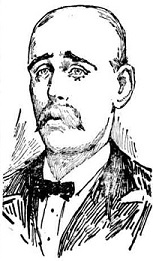
After a few weeks when Robert showed no sign of getting work yet appeared to be somehow supporting himself, the police decided to arrest him. They found quite a few suspicious items in his rooms, including a wig and a false beard. When taken to the station he was recognised twice – first by a detective who had arrested him over thirty years earlier for the holdup in a city park, and then by two female relatives of his who hadn’t known he was back in the city. The wig was identified as stolen property, and Robert wearing the wig was identified as having “stuck up” an old man and stolen his watch. Once again he defended himself, and once again he pleaded guilty to one charge and was acquitted of the other. He was sentenced to ten years for burglary for stealing the wig (along with another wig he had used to make the false beard, and a quantity of barbershop equipment that he had sold).
Robert was released in 1904, and as he had in Dunedin made an attempt to go straight by writing articles for the newspapers. He was more successful this time, but he was too old to break into the newspaper trade and so he decided to leave Melbourne. He made his way to Sydney and then on to Brisbane, presumably supporting himself through petty theft. In Brisbane on the 23rd March 1905 he tried to rob a man named William Munday, threatening him with a revolver. Munday made an attempt to rush Robert, and Robert shot him. Robert fled, but Munday was badly wounded. Later that night a policeman saw Robert walking in the small hours and questioned him. Robert gave his name as “James Wharton”, but when the policeman pushed him further he drew a pistol and tried to shoot him. The policeman was either more skilled or luckier than Munday, and managed to disarm Robert and overpower him. He was arrested and taken to jail.
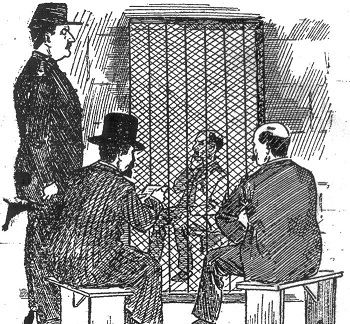
By the next day he had been identified as Munday’s attacker, and the following morning Munday died of his injuries. Robert (who was still giving his name as “James Wharton”) was charged with murder. Once again he defended himself, claiming that the shooting had been accidental when Munday had rushed him. But his actions in attacking the policeman counted against him, and he was found guilty. On the 24th May, two months after the incident, he was sentenced to death. At the same time the police finally realised that “James Wharton” was the same man as “Robert Butler”, to the delight of the newspapers. Robert himself seems to have accepted his fate stoically, and his last piece of writing was a confirmation of his faith, or rather his lack thereof.
There is an impassable bar of what I honestly believe to be the inexorable logic of philosophy and facts, history and experience of the nature of the world, the human race and myself, between me and the views of the communion of any religious organisation. So instead of the `depart Christian soul’ of the priest, I only hope for the comfort and satisfaction of the last friendly good-bye of any who cares to give it.
Finally on the 17th July 1905 the long criminal career of Robert Butler, or whatever his name truly was, came to an end. He had spent most of his adult life in prison, proving the truth of the old adage that crime did not pay. The morning of his death he played hymns on the prison organ and then he went to finally reach the inevitable conclusion of his life’s journey, on the gallows.
Images via wikimedia except where stated.
[1] Confusingly, though, the Grants were actually legally the Dewars. This was due to no sinister motive, but rather because James Grant’s mother had remarried and he had taken to using his stepfather’s surname. However since he never legally changed his name then officially his surname was Dewar. This does lead to some confusion in the newspapers.
